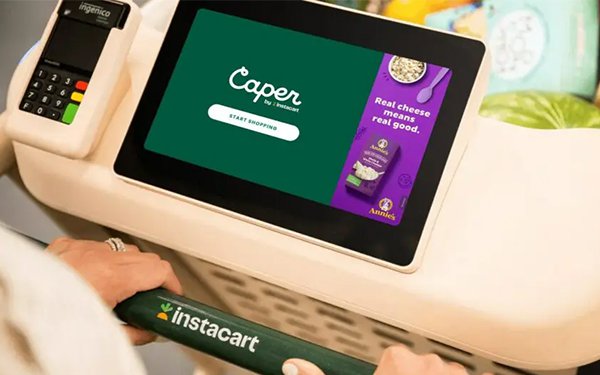Instacart Announces Rollout Of Ads To The Cart At CES
- by Laurie Sullivan @lauriesullivan, January 8, 2024

Instacart will begin piloting ads on its Caper Carts at Good Food Holdings stores such as Bristol Farms to bring personalized and real-time sponsored recommendations to physical aisles of the grocery store. The recommendations enable consumer to discover new brands and products -- and hopefully, increase the average order value (AOV) in physical stores.
Del Monte Foods, Dreyers, and General Mills are participating in the rollout.
Instacart, which estimates consumers spend more than 30 minutes shopping in-store with a Caper Cart, hopes to have thousands deployed by the end of 2024. The move will be announced at CES on Monday.
Caper Cart is a physical shopping cart powered by artificial intelligence (AI) and computer vision that reads items as the consumer puts them in the cart. It’s part of the company’s strategy to build out its online services by moving them into the physical world, according to Ali Miller, vice president of ads product at Instacart.
advertisement
advertisement
“We’re getting started by creating new experiences such as ads on screens when you’re just getting ready to shop, introducing products that are seasonally relevant, and sponsored recommendations,” she said.
If someone puts chocolate cookies in their cart, the technology might recommend Dreyer’s vanilla ice cream.
The cart reads the barcode and allows the shopper to pay for the products without going through a checkout line. Keying in an item code for produce -- for example, apples -- will weigh the product and add it to the purchase list.
The technology from Instacart Ads on Caper Carts are powered by the online ads platform that Instacart has spent the last few years scaling in-house and Caper Cart technology, which is made up of AI, cameras, and sensors built into the cart. Caper Carts was Instacart CEO Fidji Simo’s first acquisition as CEO about two years ago.
Instacart has always been interested in technology. Ironically, in February 2021, it acquired more than 250 patents from IBM and entered into a mutual patent cross-license agreement that allows Instacart to strengthen its own patent portfolio. The license gave Instacart the “freedom of action to use IBM patents in the future growth of its business.” Exact terms were not disclosed.
Some might remember that in 2006, IBM showcased a smart store TV commercial where a nefarious-looking man in a trench coat wandering the aisles of a supermarket, stuffing his pockets with various items while security guards and other patrons looked on.
A light flashed as the man exited the store with the items in his pockets, and a security guard said, “excuse me, sir.” When the man stopped and turned, the guard grabbed the receipt from a dispenser and said, “you forgot your receipt,” before waving him on.
Ads on Caper Carts will bring personalized ads experience from Instacart’s CPG brand partners to the smart cart screens, but opportunities to explore sharing data from online to offline exist certainly exists, especially with the patents Instacart acquired more than 12 years ago.
One example might be that the information gathered by the app will integrate into the Caper Cart to provide even more personalized recommendations, not just those based on a food aisle that a shopper walks down.
“We’re just starting to test and learn what works from an ads perspective,” as the company starts to rollout the cart to more stores, she said.


